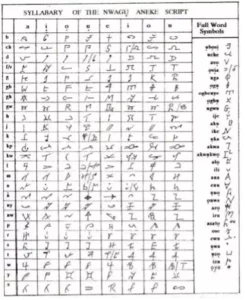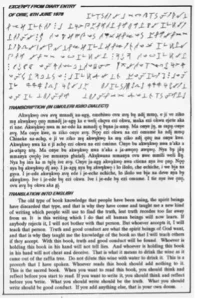J2S: Who Ogbuefi Nwagu Aneke is? The Story of a Great Diviner and Dibia (Episode 12)
When he went to bed one night, he was visited by strange beings that he later recognized as the spirits of his ancestors because they continued to pay him visits every night. Nwagu Aneke claimed that these spirits instructed him to visit the shrine of the earth goddess, Ajaana, in the sacred village of Nneyi. To carry out some purification rites because he had been chosen for a significant mission on earth despite his previous filthy lifestyle. The spirits came back one market week (izu) after this purification.
On the eve of Nigeria’s independence from Britain in 1960, Ogbuevi Nwagu Aneke, who was well-known in his village as an uneducated but extremely successful landowner and diviner (dibia afa), suddenly revealed to his perplexed and amused townspeople that he had been taught how to read and write by spirits (ndi mmuo). However, most of his kinsmen came to the conclusion that he had either gone completely insane or had become a fool. Especially after witnessing him disregard his rights, privileges, and duties as a titled medicine man and the head of his extended family, fall into poverty, and ignore the seizure of his property by land-grabbing neighbors while devoting hours upon hours of everyday writing.
Nwagu Aneke Writing Origin and Calling
In one of his earliest books, published in the early ’60s, Nwagu Aneke wrote: “The spirits told me that I would acquire the knowledge of reading and writing. They said that the work I had to do in the world was enormous and that the actions I would have to perform in the world were extensive.
“They said that it was not work that could be done from the memory that I had come to do, that the messages I deliver are not messages that could be carried fully in the memory. That the actions I had to take are not actions that could be borne in memory, otherwise, the people who now live on earth would say that I am mad. So, it was necessary that I should obtain the knowledge of reading and writing.”
Aneke claimed that after being defeated by Agwu, the Igbo god of insanity and creativity, he spent weeks prowling the forests like a rabid animal collecting tree leaves. He claims that as he approached the leaves, they even communicated with him. He asserted that each symbol became associated with a unique sound, which can be said to represent a syllable.
Syllables within the analytical framework of modern linguistics, as he copied the marks on leaf after leaf, guided by the spirits. He brings bags of tree leaves home with him. Nwagu Aneke claims that after working nonstop for years, he was able to develop a complete syllabary for the writing of his native Umuleri dialect of Igbo using this method.
His analysis of creation
In opposition to every other alienating orthodoxy, Nwagu Aneke is a radical restatement of traditional values. Nwagu Aneke restates the vitality of a triad of God, elemental deities, and spirits. All of them govern the world and control the interaction that should exist between humans and these forces.
As well as other humans and other creations in the roughly 100 exercise books still in existence that contain his messages. He contrasts this with what he sees as the antithetical religion of Christianity and the spiritual nullity of Western civilization. His daily diaries, comments on the news, and other writings all contain these persuasive arguments for a radical return to the origins of a truly indigenous African system of values and thought patterns.
Members of the Nwagu Aneke Research Team are currently transcribing these into the Roman alphabet, translating them, and editing them for literary, philosophical, and social commentary analysis.
The Aneke Script
The Nwagu Aneke script is essentially a syllabic writing system, as should be obvious by this point. It belongs to the stage in the development of writing systems where different conventional characters are employed to represent a language’s syllables (see Appendix 1 for the syllabary of the Nwagu Aneke script). But like all writing systems, including the Roman and Arabic scripts, there are a few logographs—characters that stand in for whole words or morphemes. Given the worldview and philosophy that the aneke script is promoting, these logographs that are included in the box in Appendix I may be of particular interest, but their significance is not yet fully understood.


The pictographic and ideographic phases, on the one hand, and the phonetic or alphabetic phase, on the other hand, are the phases that, in turn, preceded and followed the syllabic phase in the development of writing systems. The Nwagu Aneke system is unmistakably a part of this larger West African phenomenon. All these phases, which are not necessarily in strict chronological-evolutionary sequence, have manifested themselves in different parts of West Africa where more than thirty different types of indigenous writing systems are known to exist.
Pictographic writing appears to have developed from the early human body and surface symbolism, including that found in rock art. It is a type of writing in which man used straightforward images to convey his experiences. There are traces of picture-writing in Nsibidi—the writing system predominantly used in southeast and south-south regions of Nigeria and the southwest of Cameroon. Nsibidi is not just a pictographic language, though. It contains elements of the ideographic system of writing, showing that it probably belongs to the transitional stage between pictographic and ideographic writing.
My final thoughts…
In his books, Nwagu Aneke asserts that the black man has the same technological prowess as the white man and that his ability to write is evidence that he will eventually replace the white man, who will sooner or later be compelled to cede power.
What I find most fascinating about his story is how much his thinking is like that of most great African icons. From my knowledge, their writings generally have a similar tone when discussing the necessity for Africans to revert to our cultures and beliefs. Many western awakened Africans may still be baffled by the fact that our current condition is at odds with our true nature. This does not alter the fact that we have supposedly failed as a people since we adopted the cultures and worldviews of other people.

